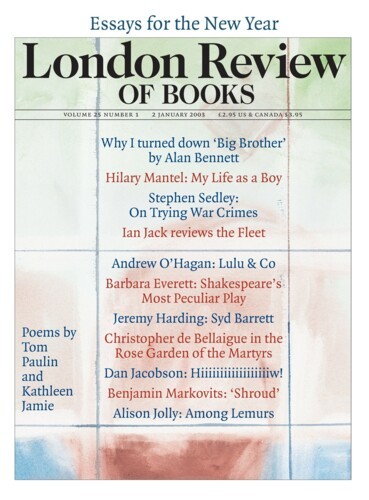‘On Good Friday 1984 I found myself laying a wreath at the Monument to the Unknown Soldier in Baghdad. This was to me extraordinary. I belong to the Church of England and have no wish to take sides in the quarrels of Muslims.’ The writer is D.A.N. Jones, who between 1980 and 1992 wrote 64 pieces for this paper and who died on 23 November.
He had arrived in Baghdad the previous day, in response to ‘an agreeably casual’ Iraqi invitation to a ‘writers’ conference’. His intention, he said, had been ‘to swan around, as an uncommitted journalist, finding out a bit about Baghdad, Arabic literature, the conservation of ancient buildings, internal politics and the conduct of the war against Iran’. At the time that seemed a bit naive to us – and so, you could say, it proved, though it’s hard to see what harm was done.
He only learned that he was expected to lay a wreath on Britain’s behalf as he walked up the steps to the monument. ‘There was no way out,’ he wrote and added: ‘I share the general view about paying respect to Unknown Soldiers.’
David had been a soldier himself, or at any rate done National Service, in Hong Kong, and probably had more sympathy for army life than most LRB contributors. Here he is, in a review of George Spater’s Life of Cobbett, brushing aside Hazlitt’s remarks about Cobbett’s bullying ways:
It is a natural tendency for a sergeant-major to get his way by bullying – both the officers and the men. A sergeant-major bestrides the ranks. He is the guardian of regimental tradition. He is in loco parentis to his men, for he comes from their class and must make sure that they are properly fed, clothed, housed, trained – and not mutinous. He must explain their needs to the officers and and interpret the officers to the rankers, who are to salute the uniform, not the man within . . . He needs an exceptional command of English, written and spoken, so that he understands and is understood by everyone in the regiment: he ought to be a wit, his words memorable.
An ability to find the world interesting, and sometimes even fun (a word he uses surprisingly often) characterises his writing. He laments the fact that Spater doesn’t ‘seem to be conscious of the charm of politics’ and envies Hazlitt his meeting with Cobbett: ‘the most valuable journalist-politician this country has ever produced’. The British used to do the journalist-politician very well. Now we have Alastair Campbell.
David was for a time a Labour councillor but he was more susceptible to the charms of political commentary. He presented himself as a plain man, and on occasion stated his own point of view very plainly, but he was also more interesting and cagier than that. Reviewing Michael Foot’s Debts of Honour he describes an occasion when he was working for Tribune and Foot was in charge. He’d written a piece about race relations that criticised two Labour MPs for their unsatisfactory (‘silly’) arguments in favour of a position he himself supported.
Foot was staring out of the window, disconsolate that he had to urge me to censor my work. Turning his head, almost shyly, he said: ‘We don’t want to attack our friends.’
‘Oh, but I think we do,’ I replied, sitting down comfortably.
The discussion continued with Foot repeatedly asking David what he had ever done for race relations:
The denunciation echoed through the thin-walled Tribune offices . . . and one of the secretaries offered me consolation afterwards, remarking: ‘He’s kept your headline.’ But I needed no consolation, having thoroughly enjoyed the way the man had made his sound points.
Papers like the LRB need writers who have that combination of ease and unease with public life; and David’s trickiness was inseparable from his virtues as a journalist. He liked to spend time in pubs and his Guardian obituarist wrote about his fondness for those he spoke of as ‘real people’ – those apparently who joined football supporters’ clubs and knew their local vicar and lived in South London.
This was always evident to anyone who knew they weren’t quite ‘real’. But it was also a pose. Ten years ago, a series of strokes brought David’s writing to an end. In 1992 the LRB had its office in a building owned by the British Medical Association in Tavistock Square. One lunchtime David came into the office to deliver his copy. Something was odd about him; he seemed to be having trouble speaking and his movements weren’t quite right. I was on my own and though I wondered if he hadn’t been drinking, I asked whether he’d come from the dentist (he did have a habit of rubbing his cheek). ‘I think I might have had a slight stroke,’ he replied. I sped down the corridor to the offices of the Heart, Chest and Stroke Association to ask their advice. ‘Call an ambulance’ was all they could manage. As we waited by the entrance for the ambulance to arrive David got out a notebook and started to write in it. A former classical scholar, he wanted to see how much he could remember of a passage from Homer.
Send Letters To:
The Editor
London Review of Books,
28 Little Russell Street
London, WC1A 2HN
letters@lrb.co.uk
Please include name, address, and a telephone number.

